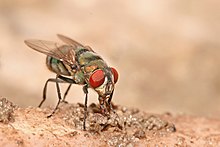Chrysomya albiceps
| Chrysomya albiceps | |
|---|---|

| |
| Scientific classification | |
| Kingdom: | |
| Phylum: | |
| Class: | |
| Order: | |
| Family: | |
| Genus: | |
| Species: | C. albiceps
|
| Binomial name | |
| Chrysomya albiceps (Wiedemann, 1819)
| |
Chrysomya albiceps is a species belonging to the blow fly family, Calliphoridae. It is of great medical and sanitary importance, being associated with myiasis in Africa and America although it plays a more significant role as a predator of other dipteran larvae.[1] The species is also of importance in forensic science and forensic entomology because it is the first insect to come in contact with carrion due to their ability to smell dead animal matter from up to ten miles (16 km) away.[citation needed] C. albiceps belongs to the same genus as the other myiasis-causing flies Chrysomya bezziana and Chrysomya putoria.
Taxonomy
Chrysomya albiceps is considered conspecific with Chrysomya rufifacies by some authorities.The two species have a similar biology and the morphological differences are slight (prostigmatic[2] bristle present in C. albiceps absent in C. rufifacies (but not all rufifacies so this character is unreliable)).There are minor differences in larval morphology.The taxonomy of C. rufifacies is therefore not completely clear, and its relation to C. albiceps has not been fully determined.[3]
References
- ^ [Margareth Maria de Carvalho Queiroz (1996). "Temperature Requirements of Chrysomya albiceps (Wiedemann, 1819) (Diptera, Calliphoridae) under Laboratory Conditions". Memórias do Instituto Oswaldo Cruz. 91 (6). Brazil: 785–788. doi:10.1590/S0074-02761996000600027. Retrieved 2009-04-18.
- ^ File:Housefly anatomy-key.svg
- ^ Baumgartner, D. L. (1993). "Review of Chrysomya rufifacies (Diptera: Calliphoridae)". Journal of Medical Entomology. 30 (2): 338–352. doi:10.1093/jmedent/30.2.338. ISSN 0022-2585. PMID 8459410.
